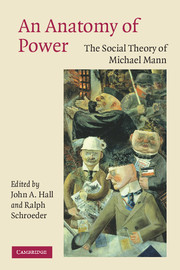Book contents
- Frontmatter
- Contents
- List of figures
- List of contributors
- 1 Introduction: the IEMP model and its critics
- Part I Theory, practice, method
- Part II Types of power
- 6 Mann's theory of ideological power: sources, applications and elaborations
- 7 Political power un-manned: a defence of the Holy Trinity from Mann's military attack
- 8 Mann, the state and war
- 9 Infrastructural power, economic transformation, and globalization
- Part III European exceptionalism?
- Part IV Promise and perils of modernity
- Part V Response
- Bibliography of Michael Mann's Writings
- Index
- References
6 - Mann's theory of ideological power: sources, applications and elaborations
Published online by Cambridge University Press: 22 September 2009
- Frontmatter
- Contents
- List of figures
- List of contributors
- 1 Introduction: the IEMP model and its critics
- Part I Theory, practice, method
- Part II Types of power
- 6 Mann's theory of ideological power: sources, applications and elaborations
- 7 Political power un-manned: a defence of the Holy Trinity from Mann's military attack
- 8 Mann, the state and war
- 9 Infrastructural power, economic transformation, and globalization
- Part III European exceptionalism?
- Part IV Promise and perils of modernity
- Part V Response
- Bibliography of Michael Mann's Writings
- Index
- References
Summary
Even in its current, unfinished state, The Sources of Social Power is probably the single most ambitious work of historical sociology to appear during the last thirty years – years in which historical sociology has enjoyed a remarkable renaissance throughout the English-speaking world. The aims of The Sources of Social Power are grand in scope and three in number: (1) to challenge reified conceptions of society and determinist theories of history; (2) to reconceive sociology as the study of social power; and (3) to re-write Western history as a history of the growth and transformation of social power. No mean task!
This chapter does not attempt to recount or evaluate the arguments of The Sources of Social Power in their entirety; that is more than one chapter – and this author – can do. Rather, it focuses on one type of social power, what Mann refers to as ‘ideological power’. It asks three questions: (1) What are the theoretical sources (and silences) of Mann's concept of ideological power? (2) What role does ideological power play (and not play) in Mann's interpretation of Western history? (3) How might we elaborate and improve on Mann's theory of ideological power? Its aims, in other words, are exegetical, evaluative and (re-)constructive.
My answers to these questions will become clearer below, but it may be useful to anticipate them here.
- Type
- Chapter
- Information
- An Anatomy of PowerThe Social Theory of Michael Mann, pp. 101 - 134Publisher: Cambridge University PressPrint publication year: 2006
References
- 8
- Cited by

